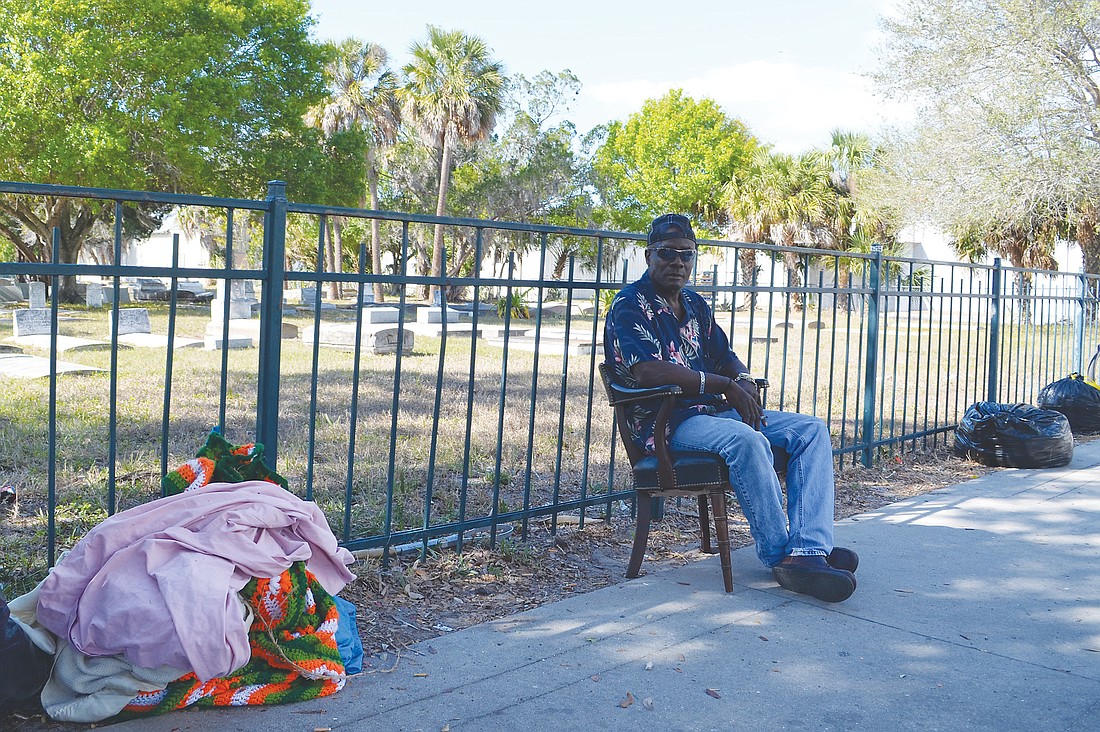- April 17, 2024
-
-
Loading

Loading

For years, Ray Seymour, a 52-year-old out-of-work handyman and tree trimmer, has been one of the homeless people camping on the sidewalk in front of the Rosemary Cemetery. Seymour has been looking for work — he filled out four job applications one day last week.
“We cool out here,” said Seymour, sitting next to his friend, Kevin Gardner, 54, who is also homeless. “We don’t get in trouble.”
The group in front of the cemetery along Central Avenue, however, has come to the attention of police and city officials, because the camp has now grown to more than 30. Residents and business owners have complained to police about the bags and the increase in homeless people.
During the day, some of the homeless people block the sidewalk, and their collection of bags stacked in the grass is visible from a half-block away.
After talking with the group in front of the cemetery Tuesday, Police Capt. Paul Sutton said the police department’s approach on Central Avenue is a “balancing act.”
“People in Rosemary don’t want to see what they perceive as trash all over the sidewalk,” Sutton said, “and we don’t want to be hauling off people’s possessions.”
City Manager Tom Barwin has made issues involving the city’s homeless population one of his priorities. He has set up a task force of city and county officials to work on “stop gap” solutions.
Yet, even as city officials seek solutions to an increase in the homeless population and crimes involving homeless in the city, particularly downtown, the recent gathering of homeless on Central Avenue illustrates the complexity of the issue, Sutton said.
City officials try to address residents’ complaints, while balancing the rights of the homeless, something the city has been criticized for from groups such as the American Civil Liberties Union (ACLU).
Barwin knows the task ahead isn’t an easy one.
“People have a right to be homeless, if they choose that lifestyle and if they don’t they violate anyone’s rights,” he said. “We do know there are some folks who fall on hard times.”
Barwin said he thinks one good next step is to hire a new social worker who will focus on substance-abuse and mental-health issues among the homeless. The new employee will work with police officers who come in contact with homeless people everyday and will also work with the Salvation Army.
On Tuesday, Jan. 29, Seymour was one of the homeless men and women in front of the Rosemary Cemetery listening to Sutton. Sutton let everyone know that Public Works would be throwing out their bags if they weren’t removed.
Seymour’s clothes, shoes and other possessions fill four of those trash bags. Seymour told Sutton he’d find a place to move his bags out of the way.
“The captain asked us to move them,” Seymour said. “I will definitely move them.”
But, Seymour said he doesn’t have many options because he doesn’t want to be camped out in the bushes with raccoons and snakes.
“People have no place to go,” Seymour said.
Four or five problems
Although many of the people encamped in front of the cemetery are not breaking the law, Bryan Pope, general manager of the Salvation Army shelter on Central Avenue, said there have been fights and some are actively using drugs.
Pope is not sure why more people are sleeping in front of the cemetery, just steps from the Salvation Army.
And, there can be different reasons why the homeless choose not to stay at the Salvation Army shelter.
In many cases there are “four or five socio-psychological problems going on, simultaneously,” Pope said.
The shelter limits free stays to people who are enrolled in a program, such as drug rehabilitation or the Salvation Army’s Street Teams program that offers job training. Those not willing to enroll are required to pay a $10-a-night fee.
In an ideal scenario, Pope said, a homeless person would come to the Salvation Army and enroll in programs to help improve his situation. He’d stay six months, get a job and move on to a new start.
“We really want them to become self-sufficient,” Pope said.
Gardner said he has only had a run-in with the police once, and that was two weeks ago when he was arrested for illegal lodging.
“We can’t afford the $10-a-night charge” to stay at the Salvation Army, Gardner said.